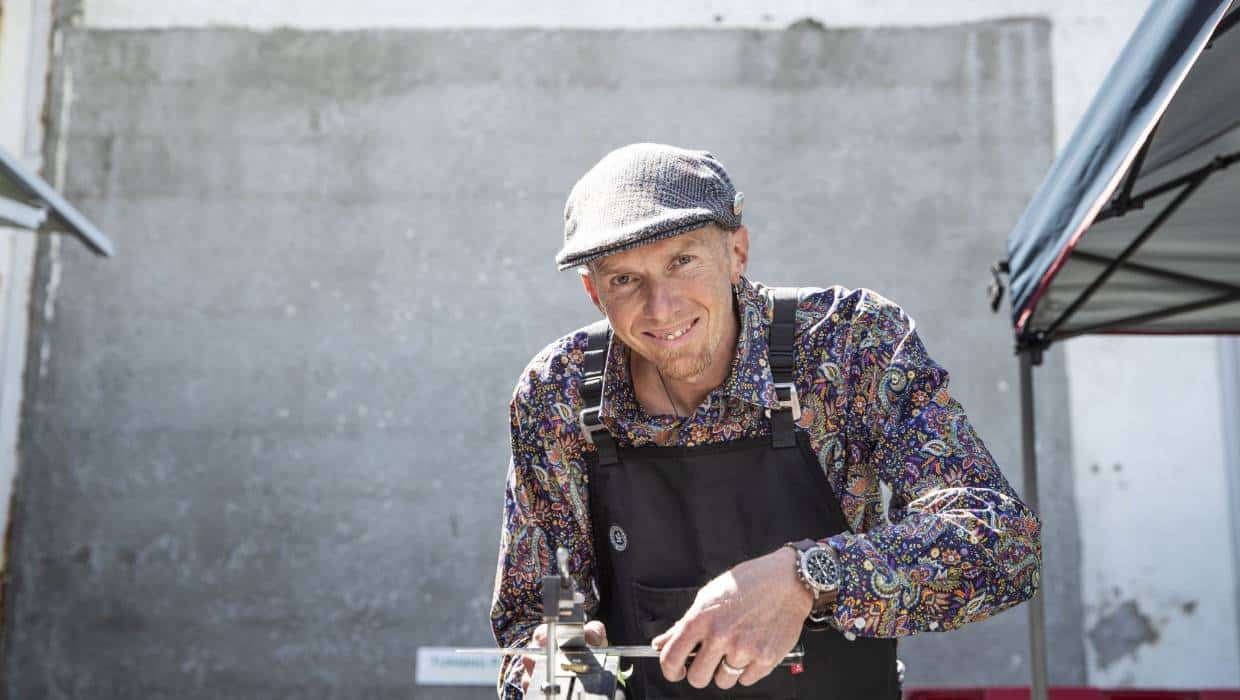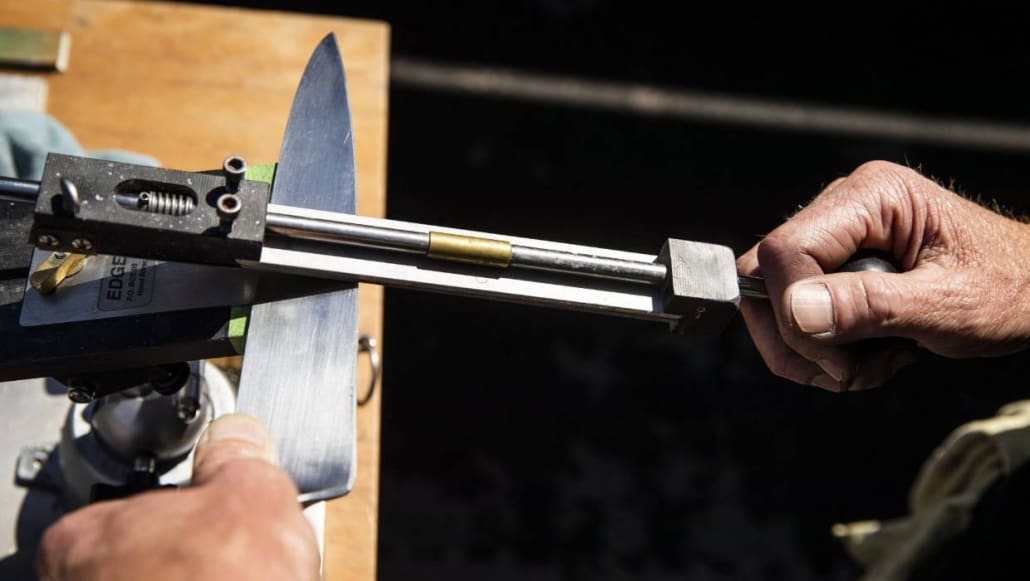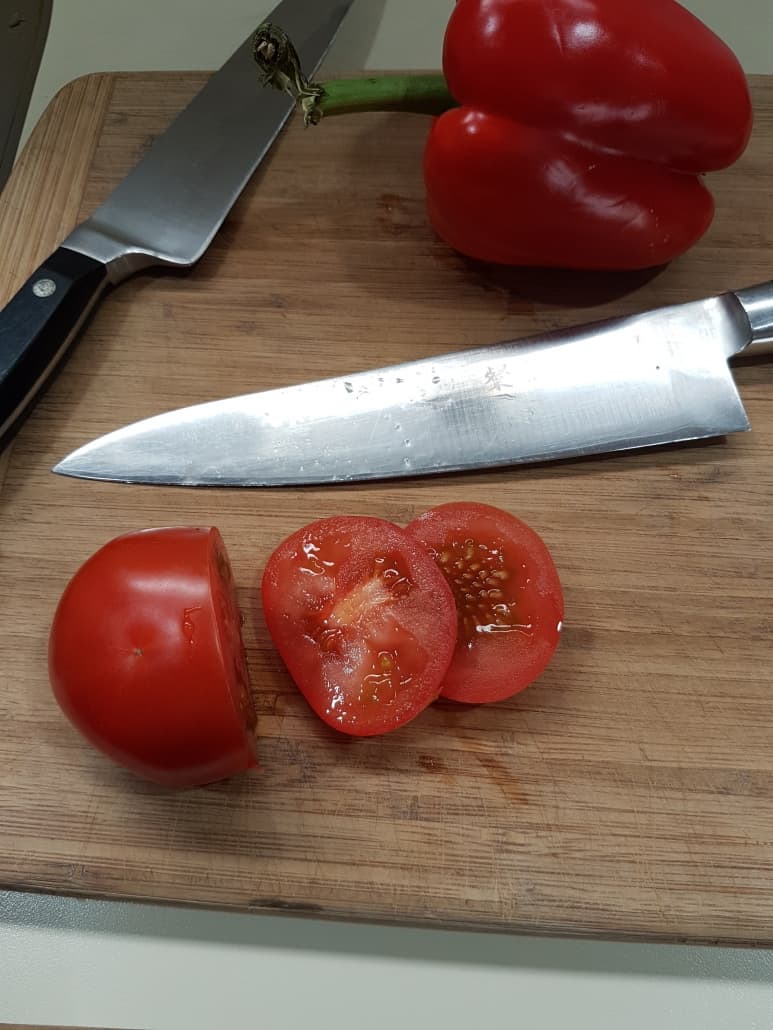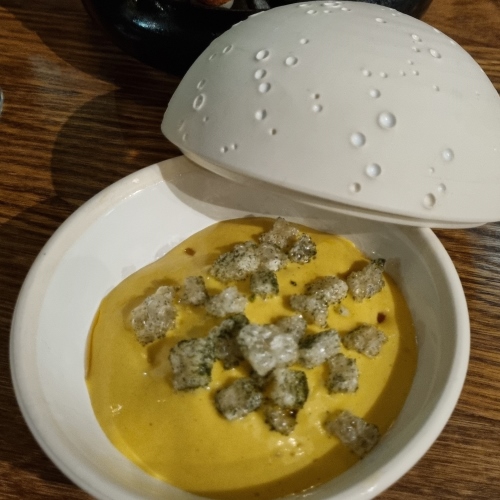
Knife sharpening
Published in the Nelson Mail 07.11.18
The rise of the TV cooking shows over the last decade or so has resulted in home cooks improving their skills in the kitchen and investing in all sorts of new gadgets, however the one gadget that never goes out of fashion is a good quality chef’s knife and that is where the sharpening service Andrew Smith provides becomes invaluable.
One thing I insist on when I’m cooking is a decent knife to use and over the years have built up a nice little collection designed for different purposes, some of these knives are quite expensive but not to the level of professional chefs who often spend hundreds of dollars on a single knife.
We have also tried all sorts of expensive gadgets to sharpen our knives but at the end of the day I prefer to use the simple steel to hone our knives, however as I discovered while talking with Andrew honing a knife doesn’t ensure the correct bevel on the knife blade for the intended purpose, it just keeps the knife edge in a usable condition.
Last week I sat down with Andrew, a few knives, some fruit and vegetables and a chopping board so he could show me the difference a properly sharpened knife makes.
The first thing he said is we should never use blunt knives because you need to use more pressure to cut things and using more pressure can lead to knives slipping and cuts to fingers, a sharp knife will cut things easily with minimum effort and it will cut much more accurately.
 He told me what he does is generally described as sharpening “but for chefs and others who work in food preparation for a living it is better described as re-profiling, once the knife has a new bevel it will stay sharp for a lot longer and is much easier to keep smooth with a steel.”
He told me what he does is generally described as sharpening “but for chefs and others who work in food preparation for a living it is better described as re-profiling, once the knife has a new bevel it will stay sharp for a lot longer and is much easier to keep smooth with a steel.”
While Andrew has a background in environmental science he has also worked for Consumer testing whiteware and equipment, including knives.
He had been sharpening knives as a hobby for a few years and his knowledge encouraged Consumer to do a knife test, including knife durability.
His interest in sharpening knives started with his own knives and then for a few friends as a hobby using a whetstone, “there is a real art to using a stone to sharpen something so I bought an expensive jig out of the United States so I could be a lot more accurate in creating different bevels on different knives.
“A friend who owned the Chocolate Fish cafe in Wellington dropped in to home one day to see what I was doing and I ended up sharpening their knives, this was the start of a part-time business and I was sharpening professional knives for a range of restaurants in Wellington.”
About four years ago he moved to Nelson with his partner and two children, they bought a section at Braemar Eco Village where he says it is like living in the country but in town so for them is the perfect place to bring up the children, the only downside being not much demand in Nelson for his specialist skills in environmental science.
By this time he had 11 years’ experience working with top restaurants and chefs so decided to re-start his knife sharpening service here, grow the business and make it a full-time job by picking up clients in different areas, including sharpening scissors for hairdressers and setting up his rather expensive jig at markets around Nelson.
“I walked the streets and talked to chefs but didn’t get much uptake because everyone is too busy, but when a chef goes to Southern Hospitality, who sell a huge range of knives, they recommended me.
“Once there is a recommendation they come to me, it is the same with salon scissors, at the high end scissors are $1000 plus for one pair and chef’s knives can be many hundreds of dollars so it takes a huge amount of trust to hand over what is a special piece of equipment to me.
“I sharpen by hand so have a lot of control over how much metal I take off, it is much more precise than using a grinder and I use a mixture of synthetic whetstones and diamond plates as well as a variety of polishes on different things, for example once the blade is sharpened I polish the edge to keep refining it, I even put polish on balsa wood and use that to achieve a premium finish on the edges.”
As you have probably guessed by now there is a lot to re-shaping a knife or scissor blade, it’s not just sliding it over a stone and giving it back, “there are lots of variables and I will then choose whether to use whetstones or diamonds (for harder steels) then decide the angle the blade needs to be sharpened at based on how the knife is used.
“I tailor the angles to usage of the knife, and then start with the coarse stone to create the correct bevel on the edge of the blade, then I will work my way down through the grits from coarse to medium then fine and stop at the level the knife can handle, Japanese steel is harder than western steel so I can put a lower angle edge on these blades and that means it is sharper and I can polish it more finely.
“Harder steel can handle the much sharper edge better than western steel and will hold that beautiful edge a lot longer.”
So what do you need to think about when you are buying a knife for home? “The western steel used in good knives are all similar and range from good quality to high quality but have pretty much the same characteristics.
“There was a time when the sign of a good knife was it was forged but these days stamped knives are every bit as good, if you know what to choose you can get a modestly priced knife that will perform beautifully.
“The next step is knives made with Japanese steel, they tend to be lighter, can be sharper and stay sharp for longer. A reasonable entry level Japanese steel knife will set you back about $150 but it will far out perform the very best western-steel knife.”
 Now remember, we are talking about proper knives here not cheap $10 knives, proper knives start at about $80- $90.
Now remember, we are talking about proper knives here not cheap $10 knives, proper knives start at about $80- $90.
Andrew says if you are considering buying decent kitchen knives then pay as much as you can afford on three, a serrated bread knife, a medium sized chef’s knife and a paring knife “that will cover 99% of what people use them for in the kitchen.”
When it comes to looking after your beautiful knives never put your good knives in the dishwasher, it will blunt them and damage the handles, especially wooden and plastic handles.
There are a few things to remember when sharpening your knives at home and for a description of how to use a steel properly check his tips and tricks on my website (toptastes.sunroom.nz)
You can take your knives to the Wednesday Farmers Market, Saturday Market or Isel Park Market, Andrew will generally sharpen them while you are shopping or contact him to make arrangements for him to collect them or for you to drop them off, he may also be able to rescue the favourite knife you have damaged in one way or another. Find him on Facebook @sharpnelson



